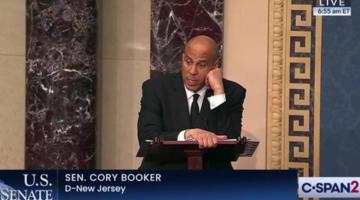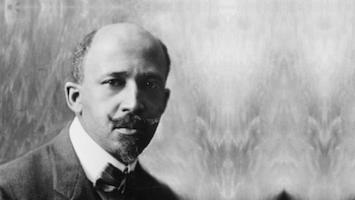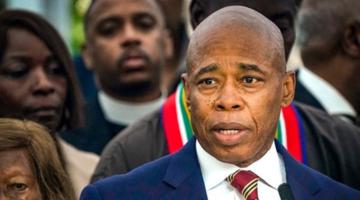Founding 13 members of the Congressional Black Caucus, 1971. Charles Rangel, standing second from the left. (Courtesy Office of the Clerk, U.S. House of Representatives)
The late Charles Rangel served as a member of the Congressional Black Caucus for more than 40 years. But the goals of Black politics and electoral politics are not necessarily the same.
“We are also supposed to be very excited about the prospect of Charlie Rangel, of Harlem, becoming head of the House Ways and Means Committee. Why? Rangel has been a front for the Clinton duo --- Hillary and Bill --- for many years. He carried their water in the NAFTA-for-Africa bill, which expanded U.S. corporate penetration of the continent exponentially.” - Glen Ford, Black Agenda Report, November 1, 2006
The recent passing of former Congressman Charles B. Rangel at the age of 94 does not mark the end of a political era. The era which defined Black politics – that is to say, a politics which consciously and purposefully made demands on behalf of Black people – ended long ago. Rangel’s 44-year tenure spanned the founding of the Congressional Black Caucus, which became known as the “conscience of the congress,” until the Democratic Party’s takeover by corporate and neoliberal interests killed off any vestiges of Black and progressive politics.
Rangel first won election in 1970 to a congressional district which primarily consisted of the majority Black neighborhood of Central Harlem. He defeated the incumbent, Adam Clayton Powell, in the democratic primary and went on to comfortably win a general election in November of that year. Rangel would continuously win elections for that same district until his last race in 2014. Over time his district came to include a portion of the Bronx and the Upper West Side of Manhattan. But Rangel was always known as Harlem’s congressman and in that role was seen as a Black political leader for the entire country. He was a founding member of what was originally a thirteen-member Congressional Black Caucus (CBC) in 1971. Now a much larger organization with 61 members, the CBC is a shell of its former self, a reliable and silent partner to the Democratic Party oligarchy which no longer attempts any efforts to speak or act independently from its white corporate overlords.
The moniker “conscience of the congress” was not an exaggeration. In its early days the CBC was given free rein and often very publicly objected to decisions made by the party leadership. As time went on, after the corporate and conservative leaning Democratic Leadership Conference (DLC) put Bill Clinton in office and took over the party, Rangel and his colleagues moved to the right along with everyone else. The defeats of CBC members Earl Hilliard and Cynthia McKinney after they were targeted by the zionist lobby in 2002 represented a political sea change. Corporate money and the insistence on complete obedience to the dictates of the American Israel Political Action Committee (AIPAC) signaled the end of Rangel and the rest of the CBC advocating for their constituents.
There was a brief reminder of what the CBC was capable of in 2004 after the George W. Bush administration carried out a coup against Haiti’s elected president, Jean-Bertrand Aristide. Rangel was among the CBC members who were closely monitoring the situation in Haiti and, after Secretary of State Colin Powell claimed that Aristide asked to be flown out of the country because he feared for his life, Rangel was polite but clear that Powell was a liar: “Both Senator [Tom] Harkin and I were in constant communication with Secretary Powell by phone, and this information about Aristide asking to leave the country or that his life was in danger was never shared with us.”
Those brief acts of resistance were the last gasp of the CBC as a meaningful political force. Although it is quite possible that if Aristide had been ousted by a democrat in the white house instead of a republican, Rangel and the rest of his CBC colleagues would not have questioned the policies carried out against Haitian democracy.
In one of the earliest editions of Black Agenda Report in November 2006, Glen Ford explained in an article entitled, “Let Black Democrats Be Black!” that Nancy Pelosi, then the democrats’ leader in the House of Representatives, kept Rangel and other CBC members on a very tight leash. Democrats were poised to win control of the House, but Ford explained the paradox of Rangel, John Conyers and other CBC members with many years of seniority becoming committee chairpersons. “On election night, we all will look forward to a bluer map on the television screens. But bluer does not mean Blacker, in a meaningful sense, if Black politicians continue on their path of subservience to corporate dollars and obeisance to the dictates of Democratic leadership.”
Rangel did become chairman of the Ways and Means Committee which, then as now, plays a large role in determining priorities for federal government spending. The position is so powerful that nearly every Harlemite anticipated the day that Rangel would chair that committee. Eventually he did, but he was undone by his own sloppiness in following ethics rules. In 2011 he was found guilty of 11 different ethics rules which included using a rent stabilized apartment for campaign purposes, and failing to file financial disclosures including income from a rental property. In the process Rangel was forced out of his chairmanship and was eventually censured.
But the committee chairmanship held only illusory benefits for Black Harlem, as did Rangel’s presence itself. Rangel was able to dispense patronage, as all members of congress do, along with Manhattan Borough President Percy Sutton, David Dinkins, who later became Borough President and mayor, and Basil Paterson, State Senator and later Secretary of State. They became known as the Gang of Four. But electoral politics didn’t control the fate of Harlem, the capitalist class did. While it can be said that he and his cohort did some good, they couldn’t end practices such as redlining which deprived Black communities of resources needed to develop.
After real estate developers decided to put money back into the cities, Harlem was full of new housing, but not for the benefit of those who lived there during Rangel’s congressional career. In the more than 40 years that he served in congress, demographics changed and so did the contours of his district. At the end Rangel had as many Latino constituents as Black constituents, and it was said that it should have a Latino representative. He faced tough primary challenges from Adriano Espaillat, who now holds that seat. Rangel was determined to leave on his terms, despite the ignominious end of his congressional career and he decided that the 2014 race would be his last.
Rangel’s last public act came after he left congress when he came to the defense of Governor Andrew Cuomo, who was fighting resignation over scandals in his personal life. Rangel’s name recognition still meant something but he squandered what was left of a good reputation when he and other Black “leaders” held an embarrassing press conference in support of Cuomo who eventually did resign. Rangel spoke of the need for due process and fighting false allegations. Some Black legislators even compared the nepotism baby governor to Emmett Till and the Exonerated Five, who were falsely accused and imprisoned for a rape they did not commit. The disgraceful showing ended as it should have, with Cuomo resigning and Rangel disappearing again from public life. Ironically, Cuomo is once again a figure in New York politics, running for mayor of New York City, an office he has a good chance of winning.
Charles Rangel’s passing is an opportunity to think seriously about how Black politics can be revived without being sentimental about politicians who happen to be Black. The CBC has nearly 50 more members now than it did when Rangel and Shirley Chisholm and John Conyers and Ron Dellums and others founded it 50 years ago. Does it matter if Black people hold office but do not meet the needs of Black voters? May Rangel rest in peace, but the rest of us should focus on how to make politics work for millions of people who currently have little or no representation in the electoral sphere that we are told is all-important but which in reality is not.
Margaret Kimberley is the author of Prejudential: Black America and the Presidents. You can support her work on Patreon and also find it on the Twitter, Bluesky, and Telegram platforms. She can be reached via email at margaret.kimberley@blackagendareport.com.



















